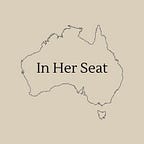Tanya Plibersek: Pursuing fairness
“I want every Australian to feel they have a say in our democracy.”
Almost 100 years ago, Edith Cowan became the first woman elected to an Australian parliament, in March 1921.
In Her Seat is asking as many currently serving female politicians as we can how they view gender equality, politics and their impact.
This is a non-partisan project that is soliciting contributions from women in all parties, or none at all, in every parliament.
Tanya Plibersek is the Member for Sydney in the Federal Parliament.
First elected in 1998, Tanya has been a minister or shadow minister since 2004. As minister, her portfolios included housing, human services, health, and the status of women. From 2013–19 she was Deputy Leader of the Labor Party.
A prominent MP, Tanya has a strong interest in education and social policy, having made wide-ranging contributions during her time. She is one of the few people to give birth while in parliament and as a minister.
Before politics, Tanya worked on domestic violence for the New South Wales Government.
What does gender equality mean to you?
Gender equality means women and men equally sharing opportunities and responsibilities in life.
Equality means being free to make your own choices, free from the straitjacket of gender stereotypes.
In practice, it means women being free to participate equally in the world of work: with financial security and independence. And it means men having the freedom to discover the joy of caring for their children and others who depend on them.
There can be no real equality until we have eliminated gender-based violence and achieved equal pay.
Which female politicians have inspired or encouraged you?
There are too many to name all of them, but my very good friends Jenny Macklin, Jeannette McHugh, Meredith Burgmann, Ann Symonds and Hazel Wilson encouraged me from the beginning.
What inspired you to serve your community?
I was brought up in a family where the default position was to help if we could.
My parents were the first to offer a hand if it was needed. My Dad used to carry water in big buckets to water the trees council had planted in the local park. The trees wouldn’t have survived the hot summers without that quiet, selfless perseverance. My Mum always had a snack and a kind word for my friends, our neighbours — anyone really. They lived their values. As post-WW2 migrants from Europe they were deeply grateful to be part of the peace and prosperity Australia offered, and they taught my brothers and I to share that gratitude and do something to repay the great good fortune of being born Australian.
I found the same thing when I joined the Labor party: people who lived their values and were determined to make the world fairer.
I didn’t join the Labor party thinking I would become a member of parliament: I joined because people of goodwill working together have achieved so much of what is great about Australia.
I wanted to work together with them to tackle the problems that remain. I wanted to be part of making Australia stronger and fairer.
What are the most important contributions you are making in parliament?
I take being a local member very seriously. I love helping my constituents when they come to my office with problems — usually people are at the end of their tether when they approach their MP for help, and if we can sort out what is troubling them it can be life-changing.
I have also deeply valued being a minister in a Labor government, able to deliver real reforms across Australia. I was grateful every day for that privilege, but the achievements that stand out include building new homelessness services and building or fixing up tens of thousands of public housing homes during the Global Financial Crisis; implementing world-first plain packaging laws to reduce smoking rates; introducing free access to Medicare dental care for children.
Other moments are smaller, more private, but just as rewarding. I love meeting people and talking to them about politics and life.
I love encouraging young people to follow their dreams.
I want every Australian to feel they have a say in our democracy.
What’s next for gender inequality?
There can be no real equality until we eliminate gender-based violence and achieve economic security and independence for women.
I’m proud of what feminists have achieved, but it is heartbreaking that my daughter’s generation face the same endemic levels of violence that my generation and my mother’s generation faced. And in some respects, things are worse today. The explosion of online child abuse material, for example.
Its also maddening that responsible, complex work such as early childhood education and care continues to be underpaid simply because it is mostly done by women.
We fight for women in Australia, but we also fight for women around the world: women in poverty, women without access to education, women without proper healthcare.
In Her Seat interviews can be accessed here
